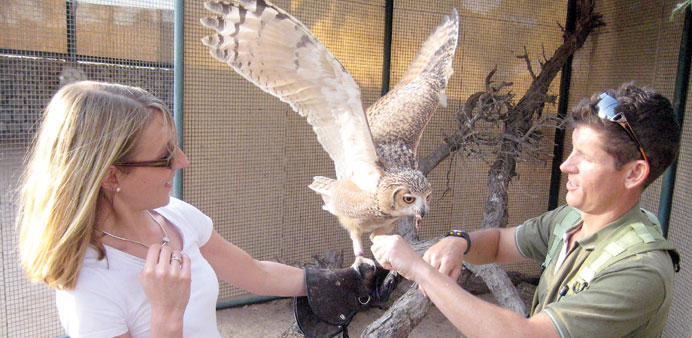A visitor wears a leather glove while Mitch (right) explains the secrets of training falcon Google.
By Michael Zehender
Kelly is overweight, which of itself would not be an issue, except for the fact that Kelly is not a person but a falcon.
The bird of prey may be only carrying an extra 112g, but falconer Mitch is still concerned. Kelly is due to do flight training, and when falcons are overweight and accordingly not hungry, there is an increased likelihood of them flying away.
“The only reason the birds return to me is to be fed,” explains Mitch, which is why he always weighs his birds before each flight. They are also fixed with a tagging device for extra security.
Kelly is one of the main attractions at the Banyan Tree Al Wadi hotel, situated in the middle of the desert in the emirate of Ras al Khaimah. It is a perfect arena for the invited visitors to see the young female falcon being put through its paces.
Mitch has tied some feather bait to a piece of rope, which he swings in the air. Kelly circles above before suddenly swooping to snatch the bait.
“Keep your heads down,” warns Mitch, who pulls away the rope from the falcon at the last moment. The exercise is repeated several times before Kelly finally gets her reward of a tasty titbit.
There is a long tradition of falconry on the Arabian Peninsula, and especially in RAK, as the locals call the emirate north of Dubai.
The birds were originally utilised for hunting, but are now used mainly for sport, explains Mitch. However, falconry is an expensive business, with bird lovers handing over up to nearly $700,000 for a particularly beautiful specimen.
The animals are nurtured and cherished by their owners. Falcons even have their own passports and get an aeroplane seat of their own when travelling.
Snowflake was bought for $60,000 but Mitch believes he is now worth 10 times that amount. The bird has since retired and is treated with tender loving care every day by Mitch. The other falcons, desert owls and hawks in the hotel’s own falconry have at least one flight each day,
Google and Yahoo had their outing in the morning, ensuring that California’s Silicon Valley is represented in the desert skies.
“The names are my responsibility,” says Mitch, before adding that the pair are not the sharpest tools in the box.
“Eating and sleeping is all that goes through their heads.”
Visitors are given protective gloves and Google and Yahoo approach them quickly once they realise they are holding small pieces of quail.
Not surprisingly, the sight of a large bird of prey approaching at speed initially instils fear, but after just a few seconds they have already plucked up the courage to stroke the beautiful birds.
The Banyan Tree Al Wadi is one of Ras al Khaimah’s flagship tourist projects. The emirate is otherwise so far lacking in any significant tourist infrastructure, admits public relations manager Nermin Abushnaf. The number of sights worth seeing can be listed on one hand.
Dhaya Fort, built on a hill in the 16th century and the last fort to fall to the British in 1819, offers panoramic views, but hardly makes a trip to RAK worthwhile on its own.
There is also the Corniche Museum, a two-storey building that opened a year ago and looks at the history of diving for pearls, the emirate’s other main tradition besides falconry.
Ras al Khaimah promotes itself as “A Rising Emirate” and there is certainly a lot going on to improve the emirate’s tourist infrastructure.
There are currently 15 hotels in Ras al Khaimah, a figure that is certain to increase in the coming years. Organised pearl farm tours are also planned for the near future.
Dubai is far ahead of its neighbour when it comes to the tourist industry, but Ras al Khaimah does not consider itself a competitor.
“Instead, we are focusing on natural experiences and beaches,” says Abushnaf, pointing to the emirate’s 46km of sandy coastline, as well as mountains, desert and nature.
RAK has another advantage for those visitors, who like Kelly are looking to keep their weight down. There is only one restaurant in the entire emirate that is not part of a hotel. That situation is also certain to soon change. — DPA

